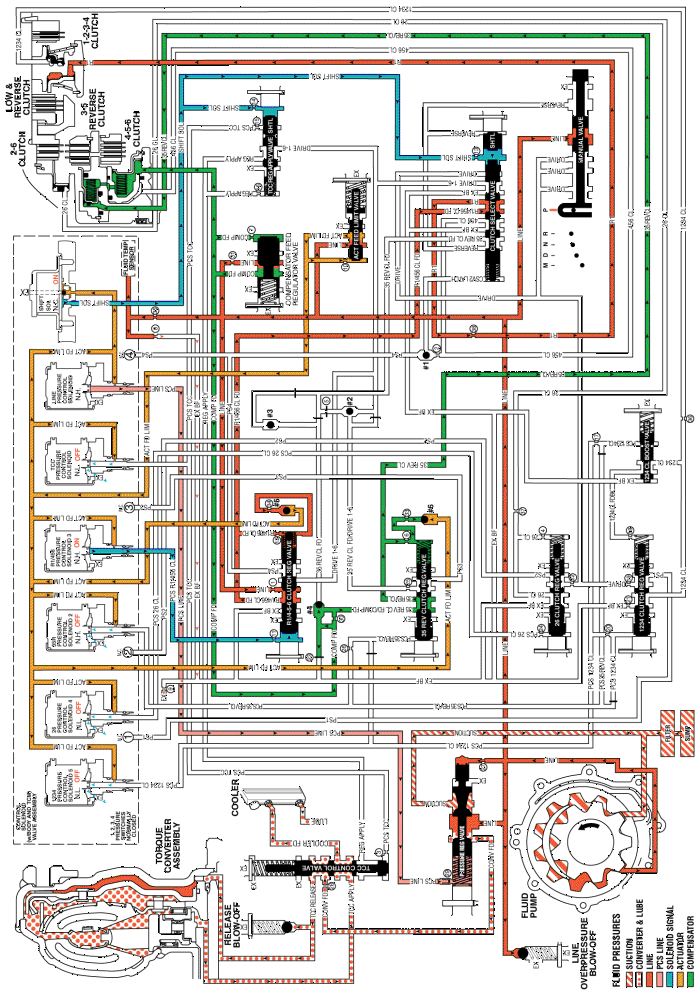Orlando |
||||||||
|
|
|
|||||||
When the gear selector lever is in the Park (P) position, fluid is drawn into the pump through the transmission fluid filter assembly. Line pressure is then directed to the following valves:
Mechanically controlled by the gear selector lever, the manual valve is in the Park (P) position and prevents line pressure from the pressure regulator valve from entering the reverse and drive fluid circuits.
Line pressure is regulated through the valve into the actuator feed limit circuit. Actuator feed limit fluid passes through orifice #10 to a differential area to move the valve against actuator feed limit valve spring pressure. Actuator feed limit fluid is routed to the pressure control solenoids, the shift solenoid, and to the #5 and #6 ball check valves.
Line pressure is regulated through the valve into the compensator feed fluid circuit. Compensator feed fluid pressure is routed through orifice #30 to the 3-5-reverse clutch regulator valve, and also fills the 3-5-reverse clutch and 4-5-6 clutch piston dam areas.
35 reverse clutch feed/compensator feed fluid is routed through the valve into the 35 reverse clutch fluid circuit. 35 reverse clutch fluid passes through orifice #6 to assist spring pressure in keeping the valve open. 35 reverse clutch fluid is routed to the 3-5-reverse clutch, and through orifice #33 to the #6 ball check valve.
35 reverse clutch fluid fills the 3-5-reverse clutch piston apply cavity in preparation for a shift to Reverse range. However, in Park range, 35 reverse clutch pressure is limited to compensator feed pressure of 9 PSI and is not strong enough to apply the clutch.
Shift solenoid fluid is routed to the TCC regulated apply valve and moves the valve against TCC regulated apply valve spring force.
The R1/456 PC solenoid is energised (ON) allowing actuator feed limit fluid to enter the PCS R1/456 clutch fluid circuit. PCS R1/456 clutch fluid is then routed through orifice #11 to the R1/4-5-6 clutch regulator valve.
PCS R1/456 clutch fluid at the R1/4-5-6 clutch regulator valve, opposes R1/4-5-6 clutch regulator spring force and R1/456 clutch feed fluid pressure to regulate line pressure into the R1/456 clutch feed circuit. R1/456 clutch feed fluid is routed to the clutch select valve and through orifice #34 to the #5 ball check valve.
The shift solenoid is energised (ON) allowing actuator feed limit fluid to enter the shift solenoid circuit. Shift solenoid fluid is routed to the clutch select valve through orifice #13, and to the TCC regulated apply valve through orifice #14.
Shift solenoid fluid is routed to the clutch select valve and moves the valve against clutch select valve spring force. This allows R1/456 clutch feed fluid to pass through the valve and enter the R1 circuit. R1 fluid is then routed through orifice #38 to the low and reverse clutch assembly in preparation for a shift into low or reverse gear.
R1/456 fluid enters the transmission case assembly and moves the low and reverse clutch piston against spring force to apply the low and reverse clutch plates. In Park range, the low and reverse has no effect. However, when Reverse or a forward range is selected, only one apply device has to be energised, which helps create a smooth starting motion.
R1/456 clutch feed fluid unseats the #5 ball check valve, allowing excess pressure to pass into the actuator feed limit circuit. This helps to control clutch apply fluid pressure and clutch apply feel.

| © Copyright Chevrolet. All rights reserved |
| © Copyright Chevrolet. All rights reserved |